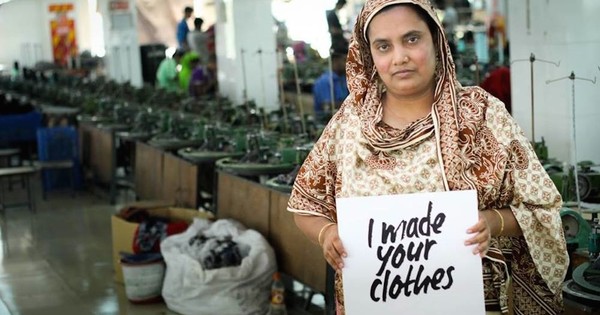Garment workers suffer as fashion brands cancel orders

Citing financial difficulties due to coronavirus, many companies are failing to pay for orders that they placed months ago.
Yesterday I wrote about the latest Fashion Transparency Index, which ranked 250 of the biggest fashion brands on how transparent their supply chains and labor conditions are. While it’s important to note that transparency differs from ethics and sustainability, it bothered me to see certain companies among the top performers on the list. I’d recently seen their names on another list that made them look much less impressive, accompanied by the hashtag #PayUp.
Due to the coronavirus crisis, many major fashion brands have reneged on contracts that they’d signed with garment factories in Asia. These cancelled, paused, or delayed orders, worth over $3 billion, have affected countless workers (mainly female, many with children to feed) in Bangladesh, Vietnam, Pakistan, Cambodia, and Burma. Bloomberg interviewed Rubana Huq, president of Bangladesh Garment Manufacturers and Exporters Association:
“More than 1,100 of these factories reported canceled orders worth $3.17 billion in export sales as of April 20, affecting 2.27 million workers, said Huq. Almost all the ‘brands’ and retailers had declared force majeure, canceling orders outright even with fabric on the cutting table, she said. The cancellations sent shockwaves through the banking industry, and now textile companies can’t get credit.”
It has created a devastating situation for garment workers, who are already notoriously underpaid for the long, gruelling hours they put in. It’s even worse in Bangladesh, where 80 percent of the country’s exports come from the garment industry. Bloomberg described a woman named Rozina whose sewing job in Dhaka has been suspended indefinitely. She said she was paid 8,000 taka ($94) for her salary in March, but that her rickshaw driver husband has had no customers due to the lockdown, and they’re running out of savings.
Another young Pakistani man, 21-year-old Waleed Ahmed Farooqui, told Bloomberg that his garment factory work was necessary to support his family and pay his university fees. He said, “What else can we do? If this lockdown continues and I can’t get another job, I will have to go out and beg on the streets.”
These awful situations echo the words of garment factory owner Vijay Mahtaney, who runs factories in India, Bangladesh, and Jordan that employ 18,000 workers. He told the BBC, “If our workers don’t die from coronavirus, they’d die of starvation.”
What’s the alternative?
The situation wouldn’t be so dire if American and European fashion brands honored their agreements, if they promised to pay for garments ordered months ago. With the way the fashion industry works, suppliers cover the upfront cost of materials and labor, with the expectation that companies will reimburse them down the road; but in this case, struggling companies are sacrificing the poorest, most vulnerable link in the supply chain in order to stay afloat. As Mahtaney told the BBC,
“Their attitude is one of protecting only shareholder value without any regard to the garment worker, behaving in a hypocritical manner, showing complete disregard to their ethos of responsible sourcing. Brand focus on share price, now means some of them don’t have money for this rainy day, and are […] asking us to help them out when they could be applying for a bailout from the US government stimulus package.”
A petition on Change.org has appeared in recent days, titled “Gap, Primark, C&A #PayUp for orders, save lives.” It shows a list of all the companies that have cancelled orders or refused to pay. These include Tesco, Mothercare, Walmart, Kohl’s, JCPenney, ASOS, American Eagle Outfitters, and more. Companies that have promised to pay up include H&M, Zara, Target, Marks & Spencer, adidas, UNIQLO, and others. The petition said this list will be updated to reflect changes, and that brands will be monitored to ensure payment actually happens. You can add your name to the petition here.
Fashion Revolution encourages concerned individuals to write letters to their favorite fashions brands, demanding that they honor the orders “already placed with their suppliers and ensure that the workers making their products are protected, supported and paid properly during this crisis.” It provides a pre-populated letter template on its website (here). It also suggests donating money to organizations that are supporting laid-off garment workers at this time, such as the AWAJ Foundation, a non-profit that provides legal aid, healthcare, union organizing, labor rights training and industry and policy advocacy assistance to Bangladeshi workers.
Companies would be foolish not to pay up and find ways to support their overseas garment workers during a hard time. It’s an investment in the security of their own future. And after so many years of profiting from dirt-cheap wages, it’s the only decent thing to do, a way to make reparations of sorts for decades of exploitation. Surely we can use this crisis to create a new type of fashion industry, one that treats the garment workers as the skilled, crucial workers they are and reimburses them fairly.
Citing financial difficulties due to coronavirus, many companies are failing to pay for orders that they placed months ago.







